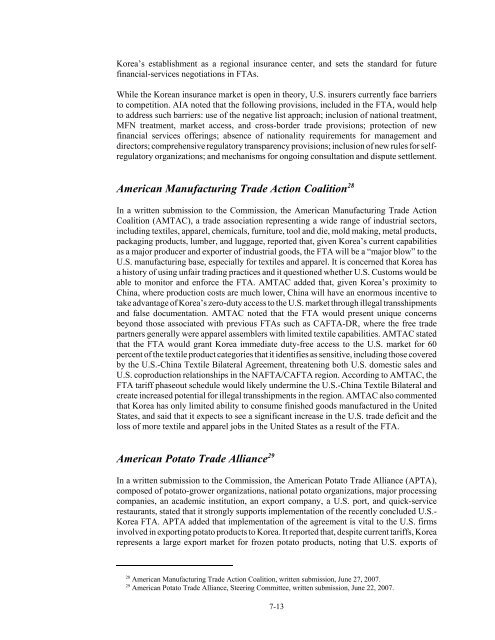U.S.-Korea Free Trade Agreement: Potential Economy-wide ... - USITC
U.S.-Korea Free Trade Agreement: Potential Economy-wide ... - USITC
U.S.-Korea Free Trade Agreement: Potential Economy-wide ... - USITC
Create successful ePaper yourself
Turn your PDF publications into a flip-book with our unique Google optimized e-Paper software.
<strong>Korea</strong>’s establishment as a regional insurance center, and sets the standard for future<br />
financial-services negotiations in FTAs.<br />
While the <strong>Korea</strong>n insurance market is open in theory, U.S. insurers currently face barriers<br />
to competition. AIA noted that the following provisions, included in the FTA, would help<br />
to address such barriers: use of the negative list approach; inclusion of national treatment,<br />
MFN treatment, market access, and cross-border trade provisions; protection of new<br />
financial services offerings; absence of nationality requirements for management and<br />
directors; comprehensive regulatory transparency provisions; inclusion of new rules for selfregulatory<br />
organizations; and mechanisms for ongoing consultation and dispute settlement.<br />
American Manufacturing <strong>Trade</strong> Action Coalition 28<br />
In a written submission to the Commission, the American Manufacturing <strong>Trade</strong> Action<br />
Coalition (AMTAC), a trade association representing a <strong>wide</strong> range of industrial sectors,<br />
including textiles, apparel, chemicals, furniture, tool and die, mold making, metal products,<br />
packaging products, lumber, and luggage, reported that, given <strong>Korea</strong>’s current capabilities<br />
as a major producer and exporter of industrial goods, the FTA will be a “major blow” to the<br />
U.S. manufacturing base, especially for textiles and apparel. It is concerned that <strong>Korea</strong> has<br />
a history of using unfair trading practices and it questioned whether U.S. Customs would be<br />
able to monitor and enforce the FTA. AMTAC added that, given <strong>Korea</strong>’s proximity to<br />
China, where production costs are much lower, China will have an enormous incentive to<br />
take advantage of <strong>Korea</strong>’s zero-duty access to the U.S. market through illegal transshipments<br />
and false documentation. AMTAC noted that the FTA would present unique concerns<br />
beyond those associated with previous FTAs such as CAFTA-DR, where the free trade<br />
partners generally were apparel assemblers with limited textile capabilities. AMTAC stated<br />
that the FTA would grant <strong>Korea</strong> immediate duty-free access to the U.S. market for 60<br />
percent of the textile product categories that it identifies as sensitive, including those covered<br />
by the U.S.-China Textile Bilateral <strong>Agreement</strong>, threatening both U.S. domestic sales and<br />
U.S. coproduction relationships in the NAFTA/CAFTA region. According to AMTAC, the<br />
FTA tariff phaseout schedule would likely undermine the U.S.-China Textile Bilateral and<br />
create increased potential for illegal transshipments in the region. AMTAC also commented<br />
that <strong>Korea</strong> has only limited ability to consume finished goods manufactured in the United<br />
States, and said that it expects to see a significant increase in the U.S. trade deficit and the<br />
loss of more textile and apparel jobs in the United States as a result of the FTA.<br />
American Potato <strong>Trade</strong> Alliance 29<br />
In a written submission to the Commission, the American Potato <strong>Trade</strong> Alliance (APTA),<br />
composed of potato-grower organizations, national potato organizations, major processing<br />
companies, an academic institution, an export company, a U.S. port, and quick-service<br />
restaurants, stated that it strongly supports implementation of the recently concluded U.S.-<br />
<strong>Korea</strong> FTA. APTA added that implementation of the agreement is vital to the U.S. firms<br />
involved in exporting potato products to <strong>Korea</strong>. It reported that, despite current tariffs, <strong>Korea</strong><br />
represents a large export market for frozen potato products, noting that U.S. exports of<br />
28 American Manufacturing <strong>Trade</strong> Action Coalition, written submission, June 27, 2007.<br />
29 American Potato <strong>Trade</strong> Alliance, Steering Committee, written submission, June 22, 2007.<br />
7-13

















